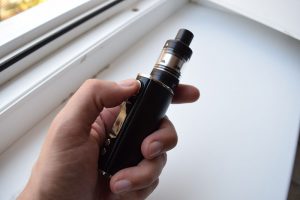Higher E-Cigarette Use Rates NOT Associated With Vaping-Related Lung Injuries, Study Finds
A recently published study from the Yale School of Public Health suggests that higher rates of vaping and marijuana use are associated with fewer EVALI cases.
 EVALI is an acronym for ‘e-cigarette or vaping associated lung injury’, but according to new research, e-cigarette and marijuana vaping in general is not the cause of the potentially deadly condition. Research at the Yale School of Public Health set out to analyze the relationship between U.S. states’ total reported EVALI cases per capita as of January 2020, and pre-outbreak rates of adult vaping and marijuana use, and came up with some very interesting results.
EVALI is an acronym for ‘e-cigarette or vaping associated lung injury’, but according to new research, e-cigarette and marijuana vaping in general is not the cause of the potentially deadly condition. Research at the Yale School of Public Health set out to analyze the relationship between U.S. states’ total reported EVALI cases per capita as of January 2020, and pre-outbreak rates of adult vaping and marijuana use, and came up with some very interesting results.
“If e-cigarette or marijuana use per se drove this outbreak, areas with more engagement in those behaviors should show a higher EVALI prevalence,” study author, Assistant Professor Abigail Friedman, wrote. “This study finds the opposite result. Alongside geographic clusters of high EVALI prevalence states, these findings are more consistent with locally available e-liquids or additives driving the EVALI outbreak than a widely used, nationally-available product.”
In September of last year, the Center for Disease Control reported an alarming number of so-called vaping-associated lung injuries, which soon became known as the ‘EVALI epidemic’. For months after that, despite lacking any scientific or medical evidence, the CDC, numerous vaping opponents, corporate media and even some politicians, blamed vaping for the thousands of lung injury cases and dozens of deaths.
In a few months’ time, it was clear that the initial assumption couldn’t have been more wrong, and in February 2020, after concluding its investigation into the ‘EVALI outbreak’, the CDC officially classified vitamin E acetate, an additive most commonly used in bootlegged THC e-liquids, as “the main cause of EVALI”.
By that time it was already too late. The name stuck and to this day people continue to associate the term ‘EVALI’ with vaping. Some opponents continue to use the serious condition and the unfortunate fatalities it caused for scaremongering, going as far as to claim that vaping is even more dangerous than smoking tobacco. Luckily, studies like the one from the Yale School of Public Health serve to confirm that vaping is not associated with this terrible condition.
Abigail Friedman’s research shows that the five earliest states to legalize recreational marijuana—Alaska, California, Colorado, Oregon and Washington – all had less than one EVALI case per 100,000 residents aged 12 to 64, while none of the states with the highest EVALI case prevalence allowed recreational marijuana use.
“If this policy led some recreational marijuana smokers to switch to vaping THC, perhaps in order to avoid detection, it would have increased their likelihood of exposure to contaminated e-liquids when those came on the market,” the researcher said. “This may have contributed to the higher EVALI prevalence in those states.”
The same applies to e-liquids, and vaping in general. The more Government tries to ban things like e-liquid flavors and devices that were not submitted through a PMTA, the higher the risk of a black market and shady, potentially deadly products. This study suggests that well-established markets with quality control protocols in place have pushed out illegal products and thus made vaping safer, whereas bans and other heavy handed approaches did the opposite.
Unfortunately, things don’t look too good for vaping in the future, but at least we continue to have the science and data on our side, and to those of us who refuse to believe the anti-vaping propaganda, that should count for something.















